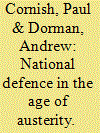| Srl | Item |
| 1 |
ID:
086947


|
|
|
|
|
| Publication |
2009.
|
| Summary/Abstract |
The Labour government's 1998 Strategic Defence Review (SDR) marked the end of almost twenty years during which Labour had been little more than a bystander in British defence policy-making. The 'foreign policy-led' SDR marked an impressive and authoritative debut, emulated by other national governments. Ten years later, however, the SDR is a fading memory. British defence is out of balance and facing immense stress, and calls are mounting for a new strategic defence review. This article examines the difficult choices which a defence review would have to make. But a defence review also requires the governmental machinery with which to analyse and understand defence, and with which those difficult choices can be made. The article argues that this machinery is wearing out. Defence policy, planning and analysis in the United Kingdom have reached a state of organizational, bureaucratic and intellectual decay which may be irrecoverable.
|
|
|
|
|
|
|
|
|
|
|
|
|
|
|
|
| 2 |
ID:
053863


|
|
|
|
|
| Publication |
Harlow, Longman, 2001.
|
| Description |
x, 158p.
|
| Standard Number |
058230377X
|
|
|
|
|
|
|
|
|
|
|
|
Copies: C:1/I:0,R:0,Q:0
Circulation
| Accession# | Call# | Current Location | Status | Policy | Location |
| 044724 | 044724/CRO 044724 | Main | On Shelf | General | |
|
|
|
|
| 3 |
ID:
075716


|
|
|
| 4 |
ID:
078708


|
|
|
| 5 |
ID:
001740


|
|
|
|
|
| Publication |
London, Macmillan, 1999.
|
| Description |
xx,198p.
|
| Standard Number |
0312220375
|
|
|
|
|
|
|
|
|
|
|
|
Copies: C:1/I:0,R:0,Q:0
Circulation
| Accession# | Call# | Current Location | Status | Policy | Location |
| 041358 | 359/DOR 041358 | Main | On Shelf | General | |
|
|
|
|
| 6 |
ID:
091629


|
|
|
|
|
| Publication |
2009.
|
| Summary/Abstract |
Preparations for the next UK defence review are under way; a struggle is imminent and the lines of battle are being drawn. There is a grave danger that in the new 'age of austerity' defence planning-and strategy generally-will be driven by tribal conflicts, either between supporters of one or other of the armed services or between contending viewpoints about the nature of conflict. And there will be others who will argue that the defence review should be driven simply by the need to reduce government expenditure, as quickly as possible. These arguments not only reduce the defence debate to a struggle between various incompatible and uncompromising tribal beliefs-'war among the fetishes', perhaps-they also miss the point. This article gauges the extent of the economic challenges which the UK defence establishment will confront over the coming decade. The authors consider how best to approach the problem of undiminished (and even expanding) commitments at a time of decreasing resources. They argue that defence planning should be driven by the notion of value (the ratio of function to cost), which in turn requires both a clear national political vision and a defence establishment which is output- rather than input-oriented. Finally, the authors assert that defence must transform itself to be able to achieve the outputs required in the most efficient and responsive manner.
|
|
|
|
|
|
|
|
|
|
|
|
|
|
|
|